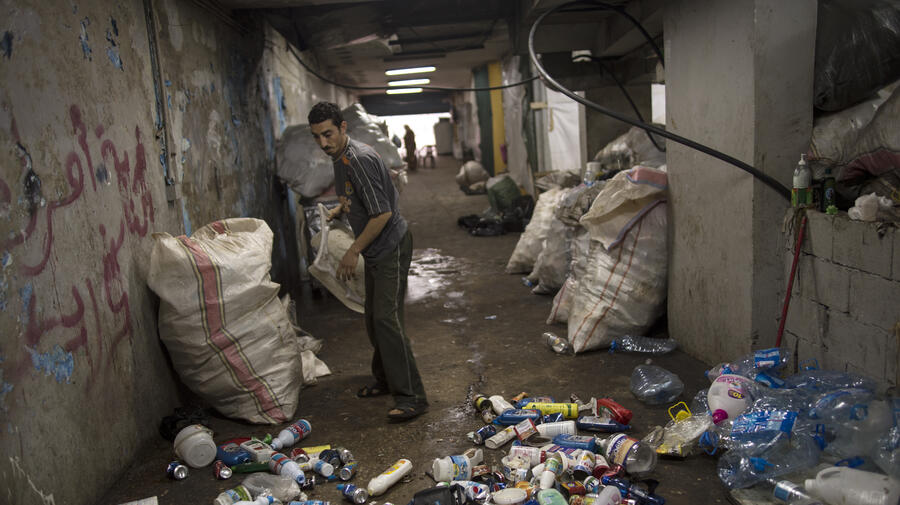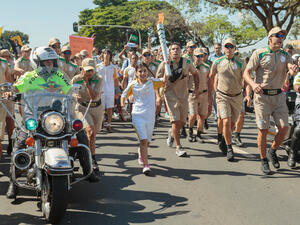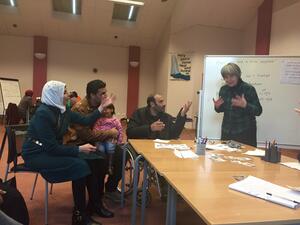School is a dream for Syrian refugee family struggling in Lebanon
School is a dream for Syrian refugee family struggling in Lebanon

An extended family of Syrian refugees lives in an underground garage and collects refuse from the streets of Lebanon in order to survive; only two of the 13 children under the age of 11 attend school.
BEIRUT, April 7 (UNHCR) - Thirteen-year-old Abdul Wahad lives in an underground garage in Beirut amid the stench of garbage. Garbage is his business. "When I grow up," he says, "I want to go to school."
Abdul Wahad is one of the 1 million Syrian refugees now registered with UNHCR in Lebanon. The number is astonishing in a country of fewer than 5 million people. In Britain it would be as if almost 15 million destitute people arrived in the span of three years.
HIs extended family of 25 live in the garage, where Mercedes Benz cars were once serviced, by choice. Despite the humidity and the occasionally seeping sewage from ceiling pipes, the family refused another dwelling UNHCR found for them. They collect garbage to make money, and the garage has space to store the bottles, cans and plastic they scavenge until the recycling firm picks it up every 10 days.
The men and boys of the family are on the streets every day to collect debris, often working until 3 a.m. The next morning the women separate the cans from the plastic bottles and stuff them in large hemp sacks. The garbage takes up half the dank subterranean shelter.
UNHCR has helped Abdul Wahad's family with wood, tarpaulins and blankets to build and furnish the five makeshift shelters in the garage, along with coupons for food. But rent, heat and electricity costs US$1,000 a month. All of them have to work. Of the 13 children under 17, only two go to school, and they then help with the sorting.
In Lebanon there are no formal refugee camps for Syrians. Seventy percent of the refugees rent rooms or flats, but accommodation is so scarce that the other 30 percent live in makeshift tents and shelters, abandoned factories, half-completed buildings, empty garages and with Lebanese families.
On average, UNHCR registers another 2,500 Syrian refugees each day. In some towns, like Chebaa or Arsal near the border with Syria, Syrians now outnumber the Lebanese.
Half the refugees are children, but most don't go to school. The Lebanese school system has created "second shifts" in the afternoon to try to accommodate the influx of Syrian children, but that only takes care of 100,000.
Back in the garage in Beirut, Abdul Wahad's grandmother, Muna, is drinking coffee in the gloom at 9:15 in the morning. She is the matriarch of the extended family in the garage - three sons, four daughters, and their children - some of whom are still sleeping.
Abdul Wahad is up, singing and trying out dance steps. A couple of the boys are kicking a half-deflated football near the bags of garbage. A girl is dragging a cloth dog on a string. The ball and the toy, like all the chairs and tables, were found in the search for garbage.
The family became refugees in early 2013, after fleeing fighting in Homs and struggling for weeks to find refuge elsewhere in Syria. "We had land and our houses were all around it. Everything is destroyed, everything is stolen. Everything. We have a well. They even stole the generator and the pump. We have nothing," says Muna.
Like so many refugees, Muna experienced violent death in the family. She talks stoically of her oldest son. He was living in Lebanon but went back to help the family. Instead he was kidnapped. His wife searched for four months before she learned he was dead.
"My son died for nothing," says Muna. "He hadn't been involved at all. He so much wanted a son, he had four girls and finally a son. But he never had the privilege of seeing him grow up." Still, she intends to take her family back to Syria when the killing stops.
As she talks, her mobile phone rings. Her daughter Ftaim is calling from Syria. She has gone back repeatedly to look for her husband, missing for months. Again there is no news. As she speaks with her daughter, Muna picks up her grandson Hamsin and holds the phone to the three-year-old's ear so he can hear his mother.
"My husband and I are old," she says. She's 58. "Now we only think of the children. Our relatives - my husband's relatives - are scattered all over, some in Turkey, some in Jordan, some still in Syria. I don't even know who is living and who is dead."
They think only of the children, but the children must work instead of going to school. She shrugs; what can they do?
Abdul Wahad joins the conversation. "After I go to school, I want to work with computers," he says. But for the foreseeable future he will work only with garbage.
By Don Murray, in Beirut









